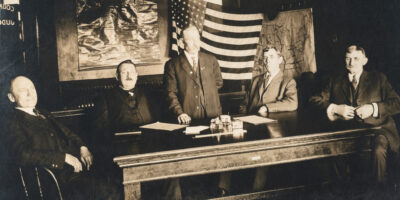Getting on Track
On Wednesday, November 10, Sound Money held a panel at annual Liberty Forum hosted by Atlas. The panel featured Judy Shelton, Sean Fieler and Steven Horwitz, with Matt Kibbe of FreedomWorks acting as moderator. Perhaps it is a bit self-serving to say that it was excellent, but the point still stands. I, personally, had little to do with choosing the panel and less to do with what the speakers chose to say. So I was as much a spectator for the event as were the other attendees. That said I wanted to give a brief summary of the event and then offer some of my own thoughts. (I will not do justice to the arguments here, but I hope that we will be able to provide audio of the event in the near future.)
Each speaker had a unique take on the issue of money and the current state of affairs. Judy Shelton took a global approach, analyzing the effects of having the dollar as a reserve currency for the world. Without a secure standard of account in the global economy, we (in the universal sense) lack constraints. Under a gold or commodity standard, there is a sure measure of value, where each nation competes in the global economy based on their efficiency in production. Nations become wealthy through cutting costs on the goods they make, lowering prices through improving methods of producing those goods. With the lack of a sound and stable reserve currency, nations become uncompetitive based on movements in exchange rates rather than because they lack production. The manipulation of the value of the currency leads to the appearance of cheaper goods, and the “competition”, rather than being on the margins of who can produce what for lower cost, takes the form of a race to see who can devalue their currency more effectively. Instead of a race to the top, whereby the world becomes richer as goods become cheaper, we have a race to the bottom, whereby currencies become weaker and inflation becomes the norm.
Sean Fieler took a more domestic approach. In an argument reminiscent of Buchanan and Wagner, Fieler argued that government deficits were a major cause of concern. The historic idea that current deficits are a future tax has vanished from the government mindset. The loss of this idea leads to inflation. A government that does not cover its deficits by taxation must inflate those deficits away. It is the spending of government that we must constrain, and one way to add constraints is to take away government’s ability to inflate away its debts. If the people of the nation had to pay, or if they could see the bill that their children would have to pay, the reaction to government spending, especially to the level we have seen in recent years, would be much different. Inflation is a mask that hides the true costs, and Fieler argues that a hard standard such as gold would take away that mask.
Steven Horwitz had a broad and forward-looking approach. He offered a summary of the current debates in the world of money and raised the questions that we must answer to move forward from where we are now. If we take it as a given that the discretionary power of the Federal Reserve is a dangerous thing, then there are a number of proposed solutions to take away that discretionary power. Three of those currently circulating through the academic debates are: 1) Constrain the Fed to a rule, such as the Taylor rule or a Friedman-esque inflation target rule, 2) End the Fed and institute a 100% gold reserve system, and 3) End the Fed and institute a system of free banking. To go along with the three proposals, Horwitz offered three related questions that academics must answer: 1) Is the Fed constrainable? 2) Is a 100% gold reserve system deflationary? 3) Is a free banking system inflationary? These are interesting and lively debates among the academic community, and Horwitz urged that as we approach these issues, if we wish to both be taken seriously and have a future impact in the policy world, we must put forward rational criticisms of the Fed and develop feasible transition proposals.
As acknowledged by all four participants, it is an interesting time to be active in the world of money and macroeconomics. We have just come through a failure of the regime, which called into question the supposed infallibility of central planning in the money supply. As Judy Shelton stated during her presentation – eleven people, heavily influenced by Ben Bernanke, determine the price of capital. Even after all we have learned since the fall of the Soviet Union, we, in the collective sense, continue to believe that money is somehow fundamentally different from other sectors of the economy. Where central planning of production fails in all other aspects, in the realm of money it works. At least this is the assumption. Yet the question we should ask is whether or not this is a realistic assumption. I would argue that history has proven it to be false. The American public was willing to cede to a monetary authority in return for stability and prosperity, but the bargain has not been kept. The problem of crises has not been solved. The Fed has not shown itself to be the savior of the market, and in many instances, it has been the cause of the failures. With attention is focused on the Fed and questions are being raised, now is the time for us to seriously consider ways in which we can get this country, and others, back on the right track in terms of money.
Tom Duncan
Sound Money Fellow
Atlas Economic Research Foundation
Image by Kenneth Cratty / FreeDigitalPhotos.net.








